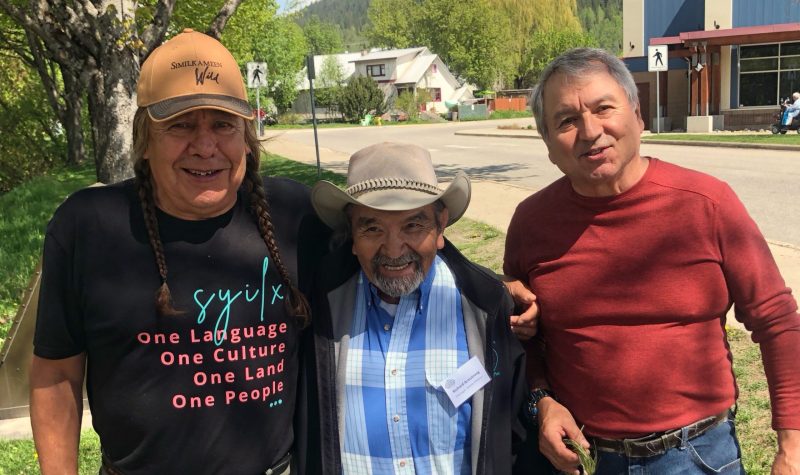At the Responsible Recreation conference this week in Revelstoke, the 140 or so people in attendance stood up as three men held an impromptu caribou ceremony at the front of the room. They were Dixon Terbasket, who's Syilx from Similkameen, Caylx Richard Armstrong, who's Sylix from Penticton, and Rick Desautel, who's Sinixt and a member of the Colville Confederated Tribes in Washington State.
Outside the community centre after the short ceremony, Armstrong said that he learned from his grandmother to do ceremonies, and that he is passing it on to Desautel and Terbasket. "It's a responsibility," he said.
At the conference, hosted by the Columbia Mountains Institute of Applied Ecology, interest groups from around B.C. gathered to talk about the intersection between the wilderness and recreation. Here in Revelstoke, where more and more people are coming to ski, snowmobile, ride bikes, and enjoy the wilderness, caribou numbers continue to decline.
For the first time in 14 years snowmobilers in Revelstoke this winter had access to areas of Frisby Ridge that had been closed off. The Revelstoke Snowmobile Club restricted riding where the Frisby caribou herd wintered. But when the B.C. government declared last fall that the herd is functionally extirpated, the club lifted the closure.
Functionally extirpated doesn't mean there aren't any caribou left in the herd. It means there are less than ten reproducing females. In an email, a spokesperson for the B.C. government said they estimate there are nine caribou left in that herd.
Amber Lane, who's with the Revelstoke Snowmobile Club and who was also at the conference, said that it was an act of goodwill that the club enforced the voluntary closure. Members of the club patrolled the ridge making sure people were riding in the right place, she said. It was a positive economic benefit for Revelstoke that there were more areas to ride on Frisby Ridge this winter, she said. Prior to that Boulder Mountain was the premier place to snowmobile in Revelstoke, but this winter she said more people were on Frisby.
Parks Canada said at the beginning of April that the remaining caribou, a cow, from the Columbia South herd, had been relocated to maternity pens near Nakusp. That herd ranged in the Mt. Revelstoke and Glacier National Parks area. That cow and nine others at the maternity pens will be released this summer into the Central Selkirks herd range.
Armstrong says it makes him sad when he hears people say they're taking care of the caribou, and that they're responsible for them. "That's not taking care when they become extirpated." He said.
There is a connection between people and animals, he said, and ceremony helps to create that connection. Taking care of caribou isn't about managing the animals, he said, it's about managing people. Along that vein, Terbasket and Desautel think that with the technology we have to track animals, that could be used to set aside land for them where recreation would be restricted. Land could be set aside to be sacrificed for recreation, they say.
"Right now our society is very righteous-based," Terbasket said, saying people think they have a "God-given right" to go where they want. Because of this attitude, he thinks we're a long way off from the public accepting being restricted from recreating on certain land.
Lane, from the snowmobile club, thinks that Revelstokians may be accepting of the idea. Right now the club manages areas for the province, including Frisby Ridge and Boulder Mountain. The fees the club accepts from riders goes back into the maintenance of the areas. And the club controls where riders park, which areas they ride in, and the club gives messaging in their parking lots and cabins about how to ride responsibly.
Riders self-police, she says, and there is a strong moral code.
Desautel isn't a religious man, he said, but he prays for the caribou. And when people ask him what he's been up to, he tells them he's been praying for the caribou because they're "damn near like us now, the Sinixt people, we're just about damn earn extinct."
When he puts it like that, it raises curiosity levels, he says, and people want to learn more about caribou.
"So when I go to the caribou ceremony and I pray for the caribou, it's not really to pay attention to myself, it's just to bring attention to the fact that there's something out there that needs to be looked at." He said.
It's like the conference, he said.
"You talk to the right people, you talk to a lot of people ... every now and then there's that one person in there that can really get the ball rolling."
Click the link below for a radio report:


